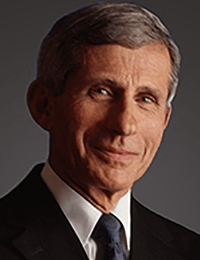The Association of American Physicians (AAP) and the American Society for Clinical Investigation (ASCI) recognize Anthony S. Fauci, MD, with a Public Service & Courage Award. The foremost purpose of this award is to draw attention to Dr. Fauci’s exemplary contributions and dedication to public health. The award also recognizes Dr. Fauci’s courage in raising his voice for a science-driven approach to public health and safety despite the risk to his personal security.
During his decades-long career as Director of the US National Institute of Allergy and Infectious Diseases (NIAID), Dr. Fauci has overseen a multitude of programs to advance the science and treatment of infections and immune disorders. Of particular note has been his commitment to transparency and honesty in communicating with the public during the ongoing COVID-19 pandemic. Dr. Fauci has strenuously advocated for the health of the nation based on science and data-driven information even as detractors have attempted to impugn his character.
The AAP, founded in 1885, and the ASCI, founded in 1908, represent thousands of physician-scientist leaders across the United States and internationally. Dr. Fauci was elected to the ASCI in 1976 and to the AAP in 1979; served as President of the AAP; and has previously received the AAP’s George M. Kober Medal for his enormous impact in the field of internal medicine and on the many outstanding scientists he has trained.
Additional reading on Dr. Fauci:
- Gallin JI. 2007 Association of American Physicians George M. Kober Medal: Introduction of Anthony S. Fauci, MD. J Clin Invest. 2007;117(10):3131–3135. https://doi.org/10.1172/JCI33692.
- Fauci AS. A view from Washington through the eyes of an AAP physician-scientist: 2007 Association of American Physicians George M. Kober Medal. J Clin Invest. 2007;117(10):3136–3139. https://doi.org/10.1172/JCI33691.
- Neill US. A conversation with Tony Fauci. J Clin Invest. 2014;124(7):2814–2815. https://doi.org/10.1172/JCI77277. [Part of the JCI series “Conversations with Giants in Medicine.”]







